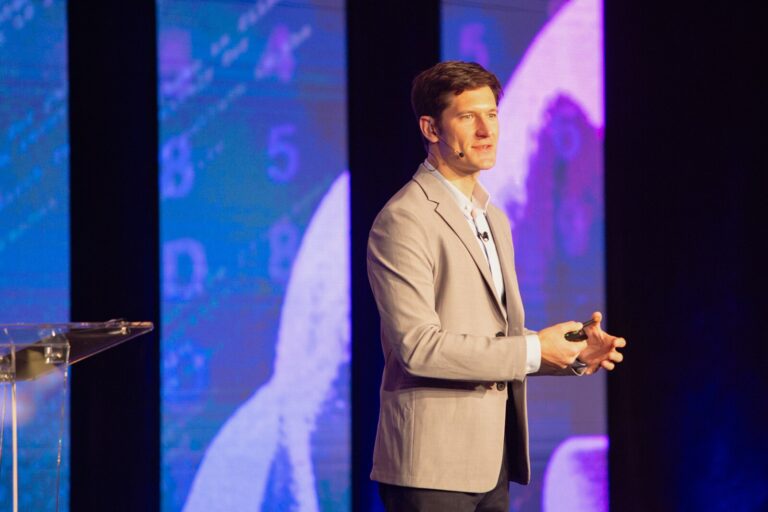FARGO — Artificial intelligence dominated the conversation as leaders from the worlds of technology and education gathered Thursday morning, Aug. 17, for the Midwest Cybersecurity and Technology Summit.
The event, hosted by the Fargo Moorhead West Fargo Chamber of Commerce, took place at the Delta by Marriott in Fargo and brought together local entrepreneurs to hear talks about artificial intelligence, quantum computing, CHIPS and the Science Act and strategies for promoting a strong technological environment.

Chris Flynn / The Forum
Michael Mattmiller, senior director of state government affairs for Microsoft, opened the summit by discussing the “artificial intelligence revolution.” While AI entered the public consciousness with newer production models like ChatGPT, Mattmiller noted that the groundwork for AI has been laid since the 1950s.
In particular, Mattmiller pointed to the emergence of cloud computing in the mid-2010s as the critical breakthrough for artificial intelligence. Cloud computing and the massive data centers that followed have brought artificial intelligence to a point where it is now on par with human accuracy, Mattmiller said.
As an example of integrating artificial intelligence into the workplace, Mattmiller pointed to CarMax. The company embraced AI to write car listing descriptions and compile reviews, estimating that AI has done in a few days what human employees could have accomplished in 11 years.
Often associated with discussions surrounding artificial intelligence are fears that the technology will eventually be used to replace human jobs. Noting CarMax's work with the technology, Mattmiller also cited data that found workers receptive to AI.
that 64% of employees lack the time and energy to meet expectations and 70% have shown a willingness to outsource work to artificial intelligence.
To that end, Mattmiller highlighted Microsoft's release of GitHub Copilot and a similar Copilot assistant in Microsoft Teams. Both are AI tools aimed at simplifying information and, in the case of GitHub Copilot, coding tasks.
While Mattmiller summarized the current state of artificial intelligence, Dakota State University President Dr. José-Marie Griffiths discussed future developments in artificial intelligence, particularly in relation to the onset of quantum computing. Quantum computers combine physics and computer science and result in computers that can solve complex problems faster than classical computers, Griffiths explained.

Chris Flynn / The Forum
As cloud computing ushered in the artificial intelligence revolution, Griffiths stated that the quantum computer “can enable artificial intelligence in a big way.” New quantum machines expected to arrive in 2024 will lead to further breakthroughs in the field, Griffiths predicted.
Of course, both Mattmiller and Griffiths warned that further AI development comes with pitfalls.
Mattmiller's data noted that 72% of respondents wanted transparency around AI policies. To achieve this goal, he stated that
Microsoft has set six core principles
as the company develops the technology: fairness, reliability and safety, privacy and security, coherence, transparency and accountability.
Political leaders around the world are scrambling to understand artificial intelligence, Griffiths said, speaking firsthand. He sits on the National Security Committee on Artificial Intelligence and noted that there is “very little knowledge” in Washington, DC, when it comes to the full scope of AI's power.
Speaking about the implications of quantum computing, Griffiths noted that quantum computers will have the power to break the classical encryptions currently used on a daily basis. Post-quantum cryptography will be a 'critical issue' in the future. Recognizing the importance, Griffiths directed listeners to
Department of Homeland Security guidelines
for the new world of computers.
Development of the local technological environment
During a panel discussion, Kristi Berg, Eileen Manning, and Shawn Riley offered their advice on how businesses, educators, and government can come together to innovate in the world of technology.
Manning, who has organized similar summits across the country, said the first step is discussions between various groups. “To build a true ecosystem, you have to talk about all the different infrastructures,” he said. “The diversity of all the different sectors is really critical to building a successful ecosystem.”

Chris Flynn / The Forum
Berg, the chair of business information technology at Minot State University, advocated investing in education to meet the workforce demands of the cyber world.
The Bureau of Labor Statistics predicts
that the demand for cybersecurity professionals will increase by 35% by 2031 with 19,500 jobs each year.
Both Manning and Berg credited North Dakota's leadership in the cybersecurity world, crediting both Riley and Gov. Doug Burgum. Riley was the state's chief information officer before leaving the position in October 2022. Riley is now the co-founder of consulting firm BisBlox.
“We're very fortunate in the state of North Dakota to have aggressive leaders like Shawn Riley and Governor Burgum,” Berg said, citing the state's cybersecurity education from kindergarten through the doctoral level, a national first.
“North Dakota, you are doing amazing things with your education,” Manning added. “It's wonderful. I wish every state was there.”
Riley noted that classroom instruction can often fall short of real-world demands, and the key to addressing this deficit is for business and government to work with educational institutions.
Citing positive programs like the state's cybersecurity education and activities, Riley urged attendees to do a better job of spreading the word. “Reality is what we're crazy about telling the story,” he said. “The reality is we have to be able to tell that story and that's going to keep talent here and that's going to bring more talent here. Because if we tell people that great things are happening here, they want to play.”
Manning also noted the Joint-State Cybersecurity Operations Center, an initiative started in North Dakota that now defends 70 million Americans from cyberattacks. “You guys are doing amazing things up here and you've had incredible leadership,” he said. “The rest of the country needs to emulate what North Dakota is doing.”

